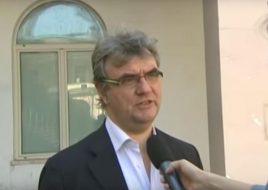
Negotiations are starting to take shape twenty days after Russia’s invasion of Ukraine, although in the meantime the United States has increased military aid to one billion dollars and Ukrainian President Zelensky rejects the condition of neutrality based on the status of Sweden. Alessandro Politi, one of Italy’s foremost experts on geopolitics, Director of the NATO Defense College Foundation, a centre for strategic affairs for promoting heightened debate on major international political topics in 70 allied and partner countries, commented on the current stage of the conflict to SIR. According to the analyst, China is the one great power that is not interested in the war, and for a simple reason: “it disrupts business.”
 Director, by now it is certain that this war is not a blitzkrieg.
Director, by now it is certain that this war is not a blitzkrieg.
It is not the war that had been imagined. While the Russians underestimated the Ukrainians and overestimated themselves, forcing a country to accept unfair conditions in twenty days is no trivial matter. In the eyes of the general public it will be neither Hollywood nor the great Israeli or American armoured manoeuvre in the 1991 Desert Sabre operation, but the outcome is what matters.
In your opinion, how far along are the talks at the moment?
Negotiations have started – as is often the case – under heavy fire. First it was only between technical experts. Then a first political meeting between the two foreign ministers, Lavrov and Kuleba, took place in Antalya. This was not a given. Now there is a greater disposition, perhaps on both sides, with some very demanding conditions, at least based on what the Russians have announced. The requested terms include: neutrality enshrined in the Constitution, the legalisation of the (clearly illegal) annexation of Crimea, recognition of de facto entities only by Russia in the Donbas.
What is the role of the European Union and the USA in this scenario?
Without the EU, Ukraine would have fallen long ago. It is a typical example where soft power is decisive. The US was prepared to discuss measures regarding transparency, disarmament and trust, but had no desire to address the political conditions set by the Russians, namely a neutral belt of countries from Belarus to Georgia. Putin has therefore reached the conclusion of waging war and thus ripping up concessions to Ukraine. The role of the United States is always beyond the horizon and is the main power that Russia has to contend with.
Is Russia’s relationship with China a true alliance?
China is a special friend of Russia, but that doesn’t mean the relationship is without its ups and downs. China has a clear understanding of the reasons for this war, but it is not in their interest for it to continue. The international order as it stands today, with the US as the dominant player, is not comfortable for them. They want to rewrite the rules with many hands. In fact, on the occasion of the Olympics, China and Russia published a document on how they see the world. The Chinese have no interest in this war because it disrupts their commercial activities, while the Russians are growing weaker and more dependent on China. China wouldn’t even need this because it does all it can to make its Russian ally feel respected.
President Joe Biden yesterday said the US will send longer-range anti-aircraft systems to Ukraine. How must we interpret this latest step?
Shoulder-fired missiles have been provided so far. The next step is probably the Russian S-300 systems operating by some NATO allies. These are powerful long-range defensive missiles. They are bigger missiles. They are hard to transport – I have no idea how they will be carried. In this war, NATO countries are neutral, but it is a benevolent neutrality towards Ukraine. There is no such thing as zero risk. The Russians have clearly declared that they would fire on vehicles suspected of carrying weapons, and they have already shelled a training facility that was probably used to train local soldiers and foreign volunteers.
In addition, Biden added on Wednesday that he would earmark $800 million for military aid to Ukraine. Combined with the aid previously pledged by the US, this brings the total to one billion dollars.
The question is to what extent this aid is admissible if the country declares itself neutral. Neutral countries generally either diversify their arms supplies or are also neutral in terms of procurement. Generally speaking, the Americans obviously expect the countries that receive their money to purchase their weapons.
Zelensky says he rejects Sweden’s model of neutrality, why?
The term ”model” serves to convey the idea but it is not an academically accurate definition. The Ukrainians, who are always very careful about the importance of words as any negotiating party, said they needed guarantees. The Ukrainians understandably insisted on guarantees since the 1994 Budapest Protocol, which had been signed by Russia, the UK and the US, provided for a number of things that were not guaranteed. Clearly, the Ukrainians cannot simply say “we are neutral.” In particular, the Swedes are neutral, but they are already NATO partners, just like all other countries from the Urals to Belarus. Russia is also a privileged partner. The Pratica di mare accords were the crowning achievement of this relationship, which has been effective for many years. This is reflected in the fact that Russia was included among the major countries for the governance of the Kosovo war.









